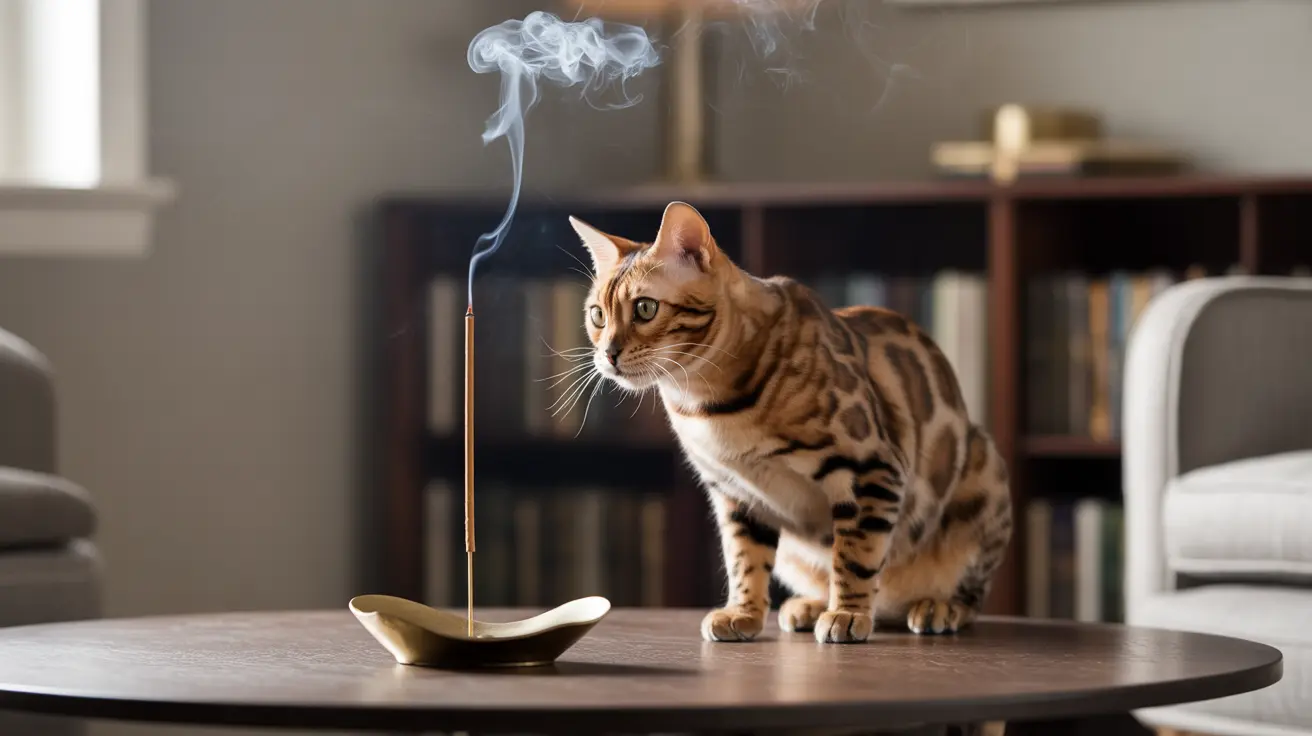Understanding Why Cats Are Sensitive to Sandalwood Incense
Cats have a remarkably sensitive respiratory system and sense of smell that's approximately 14 times stronger than humans. This enhanced sensitivity makes them particularly vulnerable to the effects of incense smoke and aromatic compounds.
The primary concern stems from cats' limited ability to process certain chemicals. Unlike humans and many other animals, cats lack specific liver enzymes (particularly glucuronyl transferase) necessary to break down and eliminate various compounds found in sandalwood incense.
Health Risks of Sandalwood Incense for Cats
Immediate Health Concerns
When cats are exposed to sandalwood incense smoke, they may experience several immediate symptoms:
- Respiratory irritation and coughing
- Sneezing and watery eyes
- Difficulty breathing
- Lethargy or unusual behavior
- Excessive drooling
Long-term Health Impacts
Prolonged exposure to sandalwood incense can lead to more serious health issues:
- Development or worsening of asthma
- Chronic respiratory problems
- Liver damage
- Potential increased risk of certain cancers
- Compromised immune system function
How Sandalwood Incense Affects Your Cat's Environment
When burned, sandalwood incense releases various compounds into the air, including:
- Polyaromatic hydrocarbons
- Benzene
- Carbonyls
- Particulate matter
These substances can settle on your cat's fur, leading to additional exposure through grooming. Cats' meticulous self-cleaning habits mean they may inadvertently ingest these harmful compounds while grooming themselves.
Safe Alternatives to Sandalwood Incense
Natural Air Freshening Methods
Consider these pet-safe alternatives for maintaining a fresh-smelling home:
- HEPA air purifiers
- Open windows for natural ventilation
- Baking soda for odor absorption
- Regular cleaning and vacuuming
- Pet-safe houseplants that naturally purify air
Creating a Pet-Safe Aromatic Environment
If you still want to create a pleasant atmosphere, try these approaches:
- Use pet-safe air purifying bags
- Place fresh herbs in out-of-reach locations
- Employ activated charcoal filters
- Use unscented cleaning products
Emergency Response to Incense Exposure
If your cat shows any of these symptoms after exposure to sandalwood incense, seek immediate veterinary care:
- Respiratory distress
- Vomiting or excessive drooling
- Disorientation or collapse
- Severe lethargy
- Changes in behavior or appetite
Frequently Asked Questions
Is sandalwood incense safe for cats, and what are the risks if it's used around them?
No, sandalwood incense is not safe for cats. Risks include respiratory irritation, difficulty breathing, liver damage, and potential long-term health complications due to cats' inability to process certain chemicals found in the smoke.
Why are cats so sensitive to essential oils like sandalwood, and how does it affect their health?
Cats lack specific liver enzymes needed to metabolize compounds found in essential oils and incense. This deficiency means these substances can build up in their system, leading to toxicity and various health issues.
What are some safe alternatives to sandalwood incense for pet owners who want a pleasant home fragrance?
Safe alternatives include HEPA air purifiers, natural ventilation, baking soda for odor absorption, and pet-safe air purifying bags. Avoid any products containing essential oils or artificial fragrances.
How can I prevent my cat from coming into contact with sandalwood oil or incense smoke if I need to use it?
If you must use sandalwood incense, burn it in a separate, well-ventilated room that's inaccessible to your cat. Ensure proper ventilation and never leave burning incense unattended.
What symptoms should I look out for if I suspect my cat has been exposed to sandalwood incense or essential oils?
Watch for symptoms such as difficulty breathing, coughing, sneezing, drooling, vomiting, lethargy, disorientation, or changes in behavior. If you notice any of these signs, contact your veterinarian immediately.
Protecting our feline friends means making informed choices about the products we use in our homes. While sandalwood incense may have its benefits for humans, the risks to cats make it necessary to choose safer alternatives that ensure both a pleasant home environment and our pets' well-being.






